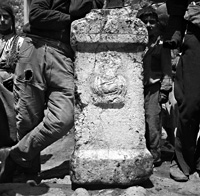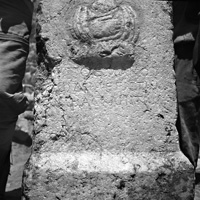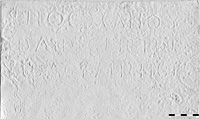 MAMA XI 248 (Kinna)
MAMA XI 248 (Kinna) 
Votive bomos of Karpos to Zeus Megistos
- Type of monument:
- Votive bomos.
- Location:
- Canımana (Kinna): in a lane, said to have been found in the village.
- Description:
- Whitish limestone bomos. On the upper moulding, boss with six-pointed rosette. On the shaft, above the inscription, male bust in relief; head defaced, right hand laid across the chest between two folds of toga.
- Dimensions:
- Ht. 1.02; W. 0.45 (upper moulding), 0.39-0.41 (shaft), 0.46 (base); Th. 0.30 (shaft); letters 0.020-0.030.
- Record:
- Squeeze; AH notebook copy; photographs (1957/15=5754-5).
- Publication:
- None.
- Date:
- Roman imperial period.
[Κά]ρ̣πος Μανου
[(?) τ]ῷ Διὶ Μεγίστῳ
[. 1-2 .] ὑῷ Ἀσκληπιῷ.
[Ka]rpos son of Manes for Zeus Megistos... his son Asklepios.






For the cult of Zeus Megistos in central Anatolia, see the commentary to MAMA XI 313 (1956/142: Perta). For a second votive bomos from Canımana for Zeus Megistos, set up by the demos of the *Arkenoi, see MAMA XI 249 (1957/33). A third votive to Zeus Megistos from the neighbouring village of Yeşilköy (RECAM II 308), 15km south-east of Canımana, presumably refers to the same local cult: [. . . . ]ς Ἀ̣ν̣τ̣ι̣ό̣[χ]ου εἱαρασάμενος τὸ πρῶτ[ο]ν Διὶ Μεγίστῳ εὐχὴν ἐκ τῶν ἰδίων.
At the start of line 2, I have tentatively restored the definitive article; the article is very rare in this context, but there does not appear to be room for more than one letter at the start of the line (thus ruling out e.g. [θε]ῷ Διὶ κτλ.). The restoration of line 3 is extremely difficult. The sense must be that Karpos set up this bomos ‘for’, ‘with’, or ‘on behalf of’ his son Asklepios (although the word order is distinctly odd), but there is very little space for a preposition at the start of the line. I presume that the Asklepios mentioned here is identical to the Asklepios son of Karpos in MAMA XI 249 (1957/33: see the commentary ad loc.). The name Ἀσκληπιός was in common use as a personal name in Galatia (seventeen examples in RECAM II); cf. also MAMA XI 251, 252 (1957/37-38, both Canımana).